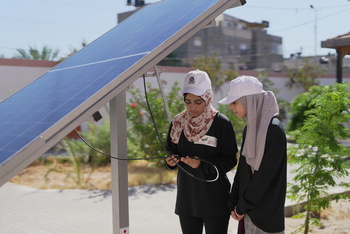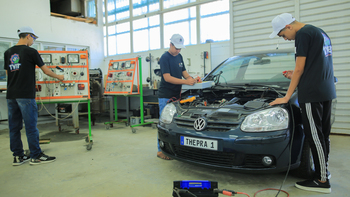State-of-the-art vocational education creating prospects for young apprentices
Demand-Oriented Technical and Vocational Education and Training II (DoTVET II)
 © GIZ/Ameen Saeb Alajez
© GIZ/Ameen Saeb Alajez
Demand-Oriented Technical and Vocational Education and Training II (DoTVET II)

German Federal Ministry for Economic Cooperation and Development (BMZ)

Palestinian territories

Palestinian territories, National TVET Commission (NTC)
Palestinian territories - National TVET Commission (NTC)

2024 to 2027

Economic development and employment

Unemployment is high in the Palestinian territories yet employers are often unable to find skilled workers. According to the local economic community, this is mainly due to technical and vocational education and training (TVET) systems failing to adequately prepare students for the world of work.
The vocational education system is highly fragmented. As a result, the Palestinian National TVET Commission (NTC) has insufficient information to manage the system.
The TVET system is becoming increasingly evidence-based and geared towards the needs of the economy. This is making it easier for young people to enter the labour market.

The project works together with the NTC, TVET institutions and industry to further develop vocational education. It is geared towards the needs of employers and apprentices and is enabling young people to be equipped for the world of work. The project is active in three areas:
1. Effective governance for the vocational education system
The project specifically supports the NTC in expanding its database, for example by coordinating with the official statistics agency. This enables the NTC's vocational education strategy to better incorporate the needs of the economy, gender equality and future issues such as renewable energies.
2. Improving quality through standards
The project is improving vocational education structurally by working with the NTC to further develop and implement standards, including a national qualification framework. This will enable employers to better understand trainee qualifications and make it easier for apprentices to switch between fields of education. The project also supports the training and further education of TVET personnel.
3. Models for cooperative education
The project supports selected vocational education institutions in becoming models for good cooperation with the private sector. The models are to serve as examples for other institutions and thus improve the entire vocational education system.
 © GIZ/Sulaiman Alfarra
© GIZ/Sulaiman AlfarraLast update: January 2025